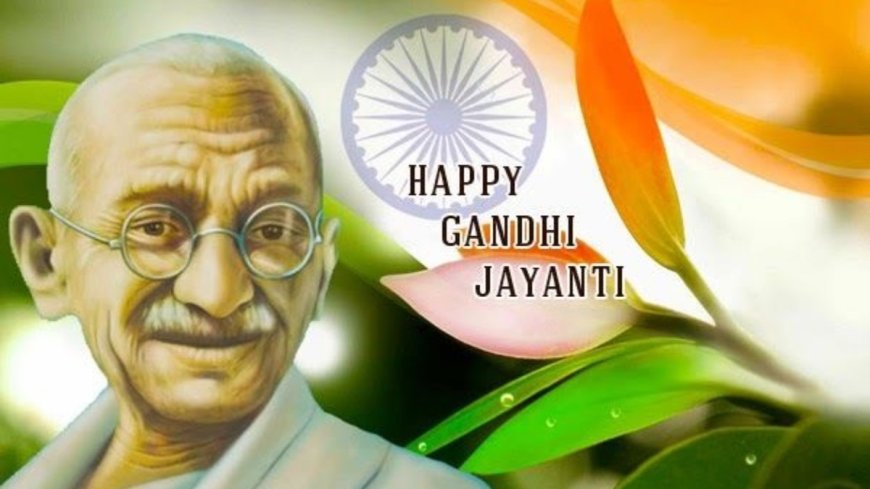Gandhi Jayanti

Gandhi Jayanti
Gandhi Jayanti is an important event celebrated in India to mark the birthday of Mahatma Gandhi. It is a national holiday in India that commemorates the birthday of Mahatma Gandhi, the iconic leader of the Indian independence movement against British colonial rule. It is observed every year on October 2nd. Gandhi Jayanti is not only a day to celebrate his birth but also a day to honor his life's work and principles.
Key aspects of Gandhi Jayanti include:
-
Honoring Mahatma Gandhi: The day is dedicated to remembering and paying tribute to Mahatma Gandhi, who is often referred to as the "Father of the Nation" in India. His nonviolent philosophy and tireless efforts played a crucial role in India's struggle for independence.
- Public Celebrations: Various events and cultural programs are organized across the country to celebrate the life and legacy of Mahatma Gandhi. These events often include speeches, exhibitions, and discussions about his principles and contributions.
- Prayer Services: On this day, people gather at various places of worship, schools, and other institutions to offer prayers, sing devotional songs, and hold events to remember Gandhi's teachings.
-
Cleanliness and Swachh Bharat Abhiyan: In recent years, Gandhi Jayanti has been associated with the Swachh Bharat Abhiyan (Clean India Campaign). This initiative encourages people to clean and maintain public spaces, promote hygiene, and work towards a cleaner and healthier India, in line with Gandhi's emphasis on cleanliness and sanitation.
-
Educational Activities: In schools and educational institutions, special activities and competitions related to Gandhi's life and teachings are often organized to educate students about his legacy.
-
Statue Garlanding: Many people visit statues of Mahatma Gandhi in public places, and some individuals and organizations garland his statues as a sign of respect.
-
Nonviolence and Peace: Gandhi Jayanti also serves as a reminder of the principles of nonviolence and peace that Gandhi espoused throughout his life. His philosophy of nonviolent resistance (Satyagraha) continues to inspire movements for justice and civil rights worldwide.
Important works and contributions of Mahatma Gandhi :
Mahatma Gandhi, also known as Mohandas Karamchand Gandhi, played a pivotal role in India's struggle for independence from British colonial rule and left a lasting impact on the world through his philosophy of nonviolent resistance (Satyagraha) and his commitment to social justice. Here are some of the important works and contributions of Mahatma Gandhi:
-
Leadership in the Indian Independence Movement: Gandhi emerged as a leader in the Indian National Congress and led various campaigns and movements for India's independence. His leadership and strategies, including nonviolent civil disobedience, were instrumental in gaining support and mobilizing the masses.
- Salt March (Dandi March): One of the most famous actions in India's struggle for independence was the Salt March in 1930. Gandhi and his followers walked over 240 miles to the Arabian Sea to protest the British monopoly on salt production and sales, highlighting the oppressive British salt tax.
-
Champion of Nonviolence: Gandhi's philosophy of nonviolence was central to his approach to social and political change. He believed that nonviolent resistance could bring about transformative change without resorting to violence. His methods influenced civil rights movements worldwide, including Martin Luther King Jr.'s struggle for civil rights in the United States.
-
Civil Disobedience Movement: Gandhi led multiple civil disobedience movements against British laws and taxes, encouraging Indians to peacefully break unjust laws and face arrest as a form of protest.
-
Promotion of Khadi (Handspun Cloth): Gandhi advocated the use of Khadi as a symbol of self-reliance and a means to provide employment to rural Indians. He himself wore simple Khadi clothing to set an example for others.
-
Empowerment of Women: Gandhi was a staunch advocate for women's rights and encouraged their participation in the Indian independence movement. He campaigned against child marriage, dowry, and other oppressive practices.
-
Work for Social Equality: Gandhi worked to eradicate the caste system and untouchability, advocating for the rights and dignity of marginalized communities. He undertook fasts and campaigns to highlight the plight of the Dalits (formerly known as Untouchables).
-
Promotion of Swaraj (Self-Governance): Gandhi's vision of Swaraj involved not only political independence from British rule but also self-governance and self-sufficiency at the grassroots level.
-
Efforts for Interfaith Harmony: Gandhi was a proponent of religious tolerance and unity. He believed in the importance of understanding and respecting different faiths and often engaged in interfaith dialogues and prayer meetings.
-
International Influence: Gandhi's principles of nonviolence and civil disobedience influenced many other movements and leaders around the world, including Nelson Mandela in South Africa, the American Civil Rights Movement, and the global peace movement.
-
Advocacy for Simplicity and Minimalism: Gandhi's personal life reflected his commitment to simplicity, frugality, and minimalism. He believed in living a life of integrity and truthfulness.
What's Your Reaction?


























































